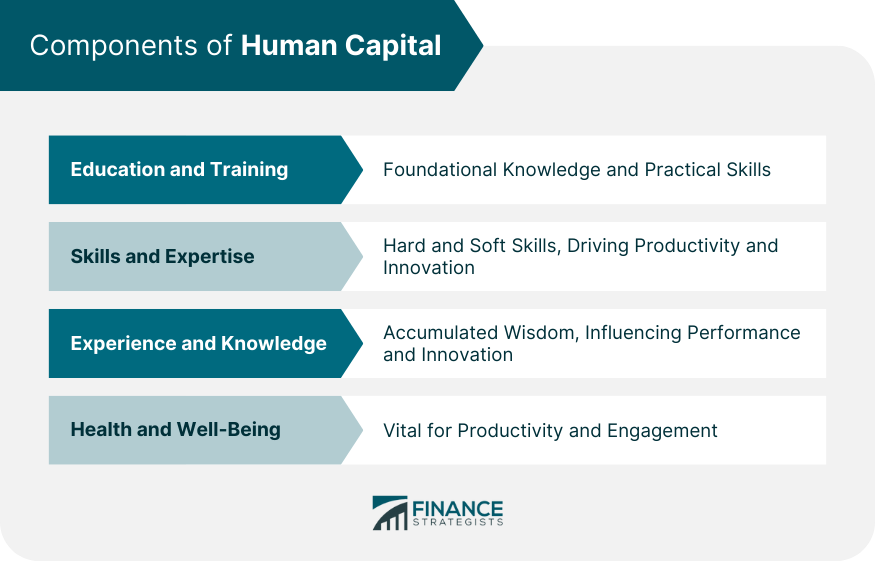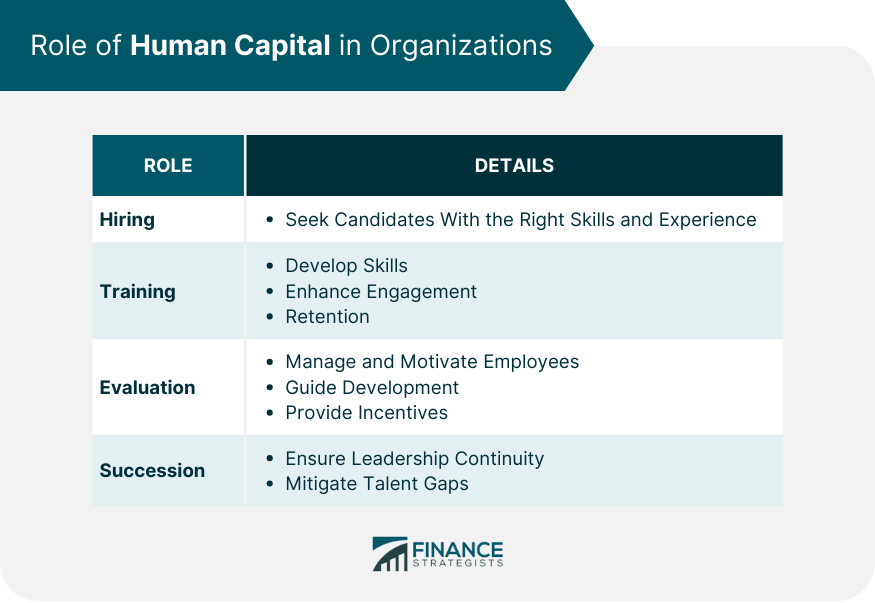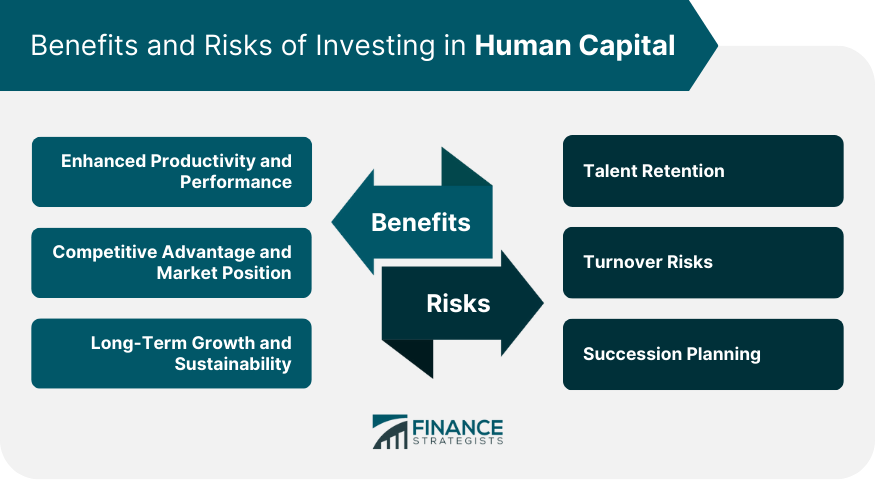Human capital refers to the economic value of an employee's skills and experience. This counts things like education, training, intelligence, health, and even qualities like loyalty and punctuality that offer some value to an employer. Human capital is considered an intangible asset, and thus it is not listed on a company's balance sheet; however, it is perceived to have a real relationship with productivity and profitability. The concept of human capital recognizes that not all labor is equal in value; however, employers can increase their human capital through things like training programs and education. Because human capital is linked to productivity, the more a company invests in its employees, the more profitable they will be. Because increased productivity also correlates with economic growth, many consider investing in human capital to be a prime way to increase economic prosperity. It refers to the collective value of capabilities, skills, knowledge, and attributes embodied in an individual that are relevant and can be used for economic activity. This term goes beyond defining people as mere means of production, recognizing the unique contribution of their intellectual capabilities, creativity, and competitiveness to the success of an organization or a nation. They provide the foundational knowledge and practical skills necessary for individuals to contribute to the workforce. Education begins at an early age and extends to higher education levels, while training is often more specific to a job or profession. In the age of rapid technological advancement, continuing education and training have become increasingly crucial. They not only equip workers with updated skills and knowledge to meet the changing demands of the job market but also enhance their adaptability and resilience in the face of economic shifts. They can be categorized into hard skills, such as technical abilities specific to a job or industry, and soft skills, like communication, leadership, and problem-solving, which are applicable across various roles and sectors. An individual's skill set and level of expertise determine their productivity and ability to contribute to an organization's goals. On a broader level, a workforce with a diverse and high-quality skill set can stimulate innovation, enhance competitiveness, and drive economic growth. Experience and knowledge are intangible assets that accumulate over time as individuals engage in work, social interactions, and various learning activities. They are vital components of human capital as they enrich one's ability to perform tasks, make informed decisions, and navigate complex situations. These assets are often tacit and personalized, making them unique and irreplaceable. For organizations, employees' cumulative experience and knowledge can form a significant competitive advantage, influencing innovation and strategic direction. A healthy workforce is more likely to be productive, engaged, and capable of sustained economic activity. Conversely, ill health can lead to decreased productivity, increased absenteeism, and higher healthcare costs for employers. Moreover, well-being extends beyond physical health. Mental and emotional well-being are equally important and can significantly impact job performance and satisfaction. Initiatives that promote a healthy work-life balance, stress management, and psychological resilience can enhance the overall quality of human capital. Like any asset, human capital is subject to depreciation over time. The most common ways for human capital to depreciate in value are through unemployment, injury, mental decline, or the inability to keep pace with innovation. Depreciation of human capital is often measured through wages or the ability to stay in the workforce. The cost of human capital is influenced by various factors, including the quality of education and training, the relevance and diversity of skills, the extent of experience and knowledge, and the state of health and well-being. These factors, however, can be influenced by other societal factors such as the quality of educational institutions, labor market dynamics, and public health conditions. Moreover, the value of human capital can vary across industries, occupations, and regions due to differences in demand for skills, technological advancement, and economic conditions. The rapid pace of technological change and globalization further adds to the complexity of human capital valuation, highlighting the need for continual learning and adaptability. Organizations seek candidates with the right education, skills, and experience that align with their business needs and culture. The process also involves assessing the potential of candidates to contribute to the company's success and growth. The quality of the hiring process can significantly impact an organization's human capital. Effective recruitment strategies can attract high-quality candidates, fostering a skilled and diverse workforce. Conversely, poor hiring decisions can lead to productivity losses, higher turnover rates, and increased costs. They provide employees with the necessary skills and knowledge to perform their roles effectively and adapt to changing job requirements. They also promote employee engagement, job satisfaction, and retention. Training can range from on-the-job coaching to formal training programs, while development activities may include leadership development, career planning, and talent management programs. Organizations that invest in training and development not only increase the value of their human capital but also create a learning culture that fosters innovation and continuous improvement. Performance evaluation and incentives are tools used to manage and motivate human capital. They provide feedback on employees' performance, guide their development, and reward their contributions. Performance evaluations can help identify gaps in skills or knowledge and inform training and development initiatives. Incentives, on the other hand, can take various forms, including monetary rewards, recognition, career advancement opportunities, and more. When effectively designed and implemented, they can motivate employees, align their efforts with organizational goals, and enhance their performance and productivity. Succession planning is a strategic process that ensures the continuity of leadership and critical roles within an organization. It involves identifying and developing potential leaders and key personnel who can fill important positions when they become vacant due to retirement, resignation, or unforeseen circumstances. Succession planning is crucial for maintaining the quality of human capital and mitigating the risk of talent gaps. It requires a deep understanding of the organization's future needs and the capabilities of its workforce. A robust succession plan can facilitate smooth transitions, maintain operational continuity, and preserve the organization's knowledge and expertise. By providing employees with opportunities for education, training, and skill development, they acquire the knowledge and abilities necessary to excel in their roles. This increased expertise translates into higher productivity levels, improved quality of work, and greater efficiency in completing tasks. Ultimately, organizations that invest in human capital witness a positive impact on their bottom line through increased output and performance. Well-trained and skilled employees contribute to innovation, creativity, and adaptability, enabling companies to stay ahead of the curve in a rapidly changing business environment. A highly capable workforce enhances the organization's ability to deliver superior products or services, resulting in customer satisfaction, loyalty, and ultimately a stronger market presence. Organizations that prioritize employee development and continuous learning create a culture of growth and adaptability. As employees acquire new knowledge and skills, they become valuable assets that drive innovation and contribute to the organization's ability to adapt to evolving market conditions. Moreover, investing in human capital fosters employee loyalty, reduces turnover, and attracts top talent, providing a solid foundation for sustainable growth and success in the long run. Managing the risk of talent loss is a crucial aspect of human capital risk management. High turnover rates can result in the loss of valuable skills, knowledge, and experience, disrupt operations, and incur substantial replacement costs. Therefore, organizations need to implement effective retention strategies, such as competitive compensation, career development opportunities, and a positive work environment, to keep their valued employees. Moreover, organizations should monitor turnover rates and employee satisfaction levels to identify potential issues and take preventive measures. An understanding of the reasons behind employee departure can help organizations make necessary adjustments to their practices, fostering a more engaging and satisfying workplace. Succession planning for key personnel is another essential component of human capital risk management. Without a robust succession plan, the departure of key personnel can leave a critical leadership vacuum and result in the loss of valuable knowledge and expertise. Organizations should identify potential successors for key positions and invest in their development to ensure they are ready to step into these roles when needed. This not only mitigates the risk associated with unexpected departures but also helps preserve institutional knowledge and maintain continuity of operations. Human capital, defined as the economic value of an employee's skills, experience, and attributes, plays a vital role in finance and organizational success. It encompasses the knowledge, skills, experience, and well-being of employees, which collectively contribute to enhanced productivity and performance. By investing in human capital through education, training, and development programs, organizations can gain a competitive advantage and strengthen their market positioning. Moreover, such investments promote long-term growth and sustainability by fostering a culture of continuous learning, innovation, and adaptability. However, managing the risks associated with human capital, such as talent retention and succession planning, is crucial for maintaining a skilled and engaged workforce. By recognizing the benefits of investing in human capital and effectively mitigating risks, organizations can maximize their returns and drive both individual and collective success in the dynamic field of finance.Define Human Capital in Simple Terms
What Does Human Capital Mean in Finance?
Components of Human Capital
Education and Training
Skills and Expertise
Experience and Knowledge
Health and Well-Being

Cost of Human Capital
Role of Human Capital
Hiring and Recruitment
Training and Development
Performance Evaluation and Incentives
Succession Planning

Benefits of Investing in Human Capital
Enhanced Productivity and Performance
Competitive Advantage and Market Position
Long-Term Growth and Sustainability
Risks Involved With Human Capital
Talent Retention
Turnover Risks
Succession Planning

Conclusion
Human Capital FAQs
Human capital refers to the economic value of an employee’s skills and experience.
Human capital counts things like education, training, intelligence, health, and even qualities like loyalty and punctuality that offer some value to an employer.
Human capital is considered an intangible asset and thus it is not listed on a company’s balance sheet. However, it is perceived to have a real relationship with productivity and profitability.
Because human capital is linked to productivity, the more a company invests in its employees, the more profitable they will be. Increased productivity also correlates with economic growth. Many consider investing in human capital to be a prime way to increase economic prosperity.
Like any asset, human capital is subject to depreciation over time. The most common ways for human capital to depreciate in value are through unemployment, injury, mental decline, or the inability to keep pace with innovation.
True Tamplin is a published author, public speaker, CEO of UpDigital, and founder of Finance Strategists.
True is a Certified Educator in Personal Finance (CEPF®), author of The Handy Financial Ratios Guide, a member of the Society for Advancing Business Editing and Writing, contributes to his financial education site, Finance Strategists, and has spoken to various financial communities such as the CFA Institute, as well as university students like his Alma mater, Biola University, where he received a bachelor of science in business and data analytics.
To learn more about True, visit his personal website or view his author profiles on Amazon, Nasdaq and Forbes.













